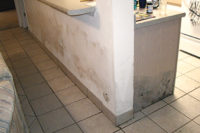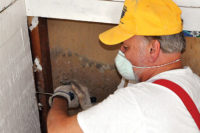Mold is a serious threat, especially in areas such as the Deep South, where moisture and humidity pose a constant problem for HVAC contractors.
Even though mold remediation could potentially open a new revenue stream for HVAC contractors, some believe their peers don’t take mold nearly seriously enough.
In Louisiana, “toxic molds” are defined as those that produce compounds called mycotoxins. Mycotoxins are produced as a defense against other microorganisms. “Black toxic mold” can refer to a certain type of mold — Stachybotrys chartarum (also known as Stachybotrys atra). Black is a color, not a type of mold. Therefore, not all black molds are Stachybotrys chartarum.
“The majority of air conditioning contractors, at least the ones we see here, don’t have the necessary state mold remediation license; they don’t want it,” said Mike White, ASCS, CEO, Clean Air Systems of Louisiana, Shreveport, Louisiana. “They’re interested in selling boxes to people, and that’s it. I’ve gone in behind some of these guys who’ve installed a brand new air conditioning system, and we’ve found mold growing on the ceiling and blowing out of the duct work. [The customer] wants to know why they weren’t made aware of the mold.”
Jason Fricks, owner, Keystone Air Care Inc., Seneca, South Carolina, insists most HVAC contractors aren’t taking mold as seriously as they should. Because they are working around it so often, they are, to an extent, immune to its effects.
“It’s present in probably half the systems we see, and most kind of just ignore it because they don’t know how to deal with it, don’t know what it is, or are scared of the liability if they mention its existence,” Fricks said.
Regulation Station
Larry Pearson, president, Panoramic Building Performance Solutions, Bradenton, Florida, is, to put it nicely, not pleased with how the Sunshine State approaches mold.
“The state of Florida is doing an absolutely terrible job enforcing the licensing of mold remediation,” Pearson said. “Insurance companies routinely hire unlicensed mold contractors to handle their claims. It’s an absolute joke. They don’t want to pay. I get involved in these mold-damaged products, and my prices are always too high because people want to use unlicensed contractors. While you’d think an insurance company would require proper licensing for any work they hire out, to avoid liability, they don’t.”
Fricks said states need to have mold regulations like they do for lead and asbestos. He realizes, though, that state regulations might be unrealistic.
“More than half of the people are going to ignore the regulations anyway, especially heating and air conditioning contractors who are not EPA [U.S. Environmental Protection Agency]-certified or mechanically certified to do the work,” Fricks said. “In South Carolina, there’s an environmental department that regulates the state and closely watches the work. If other states had something similar, it would change the way people react to it.”
In Louisiana, due to a change in the law, White’s work with mold is now lumped in with things like asbestos, meaning he has to pay asbestos-like insurance rates.
“It’s very expensive, and the testing is expensive,” White said. “A lot of these guys want to go in, get it done, and get on to the next one. We take a different approach because we got into heating and air conditioning after doing duct cleaning. We’ve been NADCA [National Air Duct Cleaners Association]-certified since 1989. We were seeing many cases where mold was being handled improperly, so we really wanted to learn why and how to do it right.”
From what Pearson has observed in Florida, many air conditioning contractors are just “winging it” when it comes to addressing mold.
“All states need to enforce the licensing they created by law,” he said. “I think it’s been about two or three years since they finally made it a law here, so, over time, it will evolve and get better.”
D. Douglas Hoffman, executive director, National Organization of Remediators and Mold Inspectors (NORMI), said mold regulation is a touchy topic.
“Many progressive legislators and senior statesmen are now considering the need for good mold licensing legislation at the state level. Currently, only a few states have such laws governing the licensing of mold inspectors and mold remediators, and the tendency to overregulate or under-regulate seems to produce unwanted results,” he said. “On one extreme, a law could be so strictly written so that anyone who touches mold is considered a candidate for licensing and that would drive those who want to work in the mold industry out of the state into neighboring states. At the other extreme, the law might be so vague that it could apply to no one as well as it applies to everyone. In either case, the public and the industry loses.”
The Need for Knowledge
There’s no doubt more could be done when it comes to mold education. Everyone, from contractors to builders to home inspectors to homeowners, could benefit. The question is: How?
“Not a lot of people understand mold, where it comes from, and what causes it,” Fricks said. “There are lots of unknowns, and people don’t want to deal with it, even if it extends an extra opportunity for profit.”
White said, in his neighborhood, mold is not for everyone. This sentiment was recently echoed by the state of Louisiana legislature, which passed SB 66 regulating who can address mold issues, and how mold is reported to a homeowner.
“In Louisiana, for years, anybody could do mold,” he said. “We actually worked very hard to get that changed. Now, all mold testing has to be done by a third-party company. If you do the testing, you can’t do the remediation, and vice versa. It’s illegal to do that and you can go to jail. Now, if you are a home inspector, you have to document any mold you find. Since the bill passed, my phone has rung off the wall because these individuals aren’t sure what to do with it. I’ve since taken a proactive approach in helping to educate home inspectors and realtors about the realities of mold.”
Although Pearson believes homeowners are aware of mold, he believes contractors could greatly benefit from more education, which could then be transferred to the homeowner, because, today, mold is typically used as a fear tactic, he said.
“The major associations should be pushing for their air conditioning contracting members to become more educated and certified on mold,” Pearson said. “It’s to everyone’s benefit. There are numerous business opportunities when you have the expertise.”
Mold is tricky, Fricks said, because while you can treat it and clean it up, unless you find the source, it’s just going to come right back.
“You have to stand behind the work you do,” Fricks said. “With our business, we usually offer, at minimum, a five-year guarantee on the work we do. If it comes back, you better believe I’ll be out there trying to figure out what went wrong.”
White noted that contractors need to be on top of mold for one reason above all others: liability.
“If you’re out there and you’re serving that unit, you need to be aware,” White said. “If something happens, you stand to be liable for the work you’ve done. There are lots of attorneys out there looking to sue people, plain and simple as that.”
Publication date: 8/11/2014
Want more HVAC industry news and information? Join The NEWS on Facebook, Twitter, and LinkedIn today!










